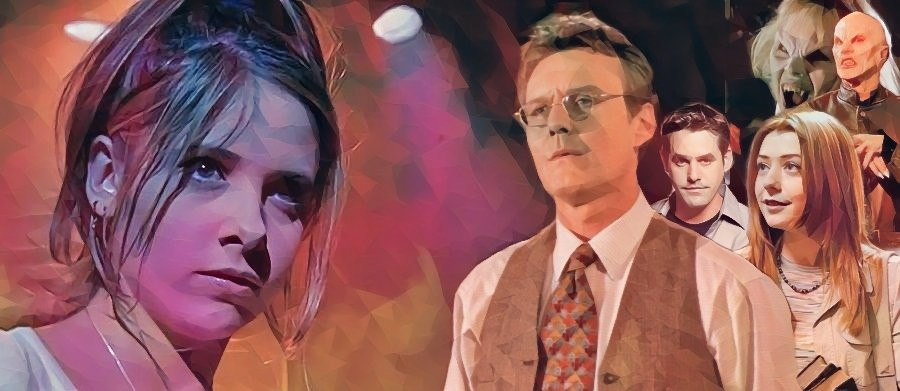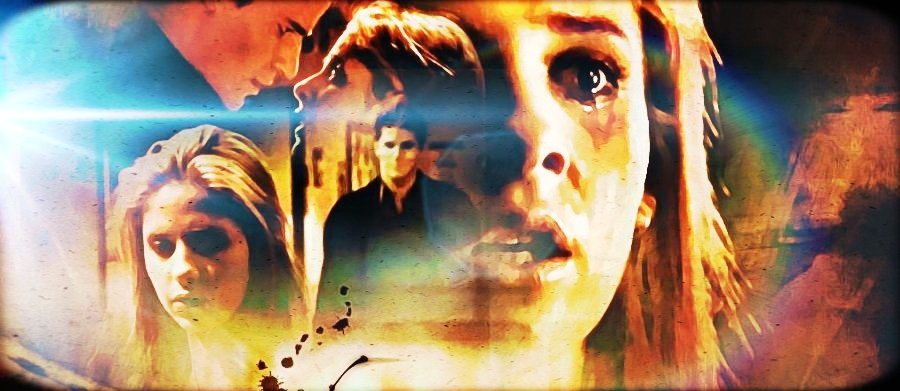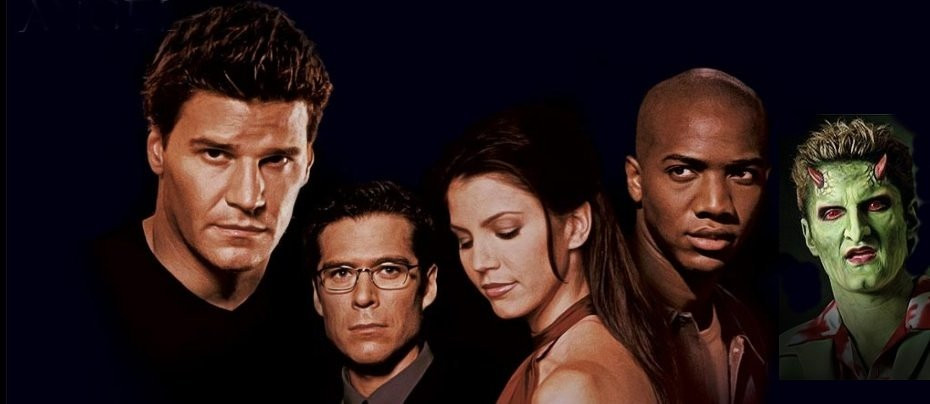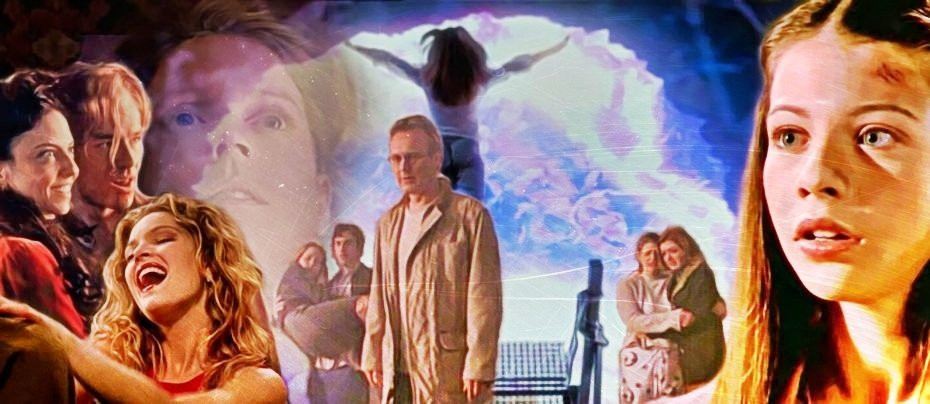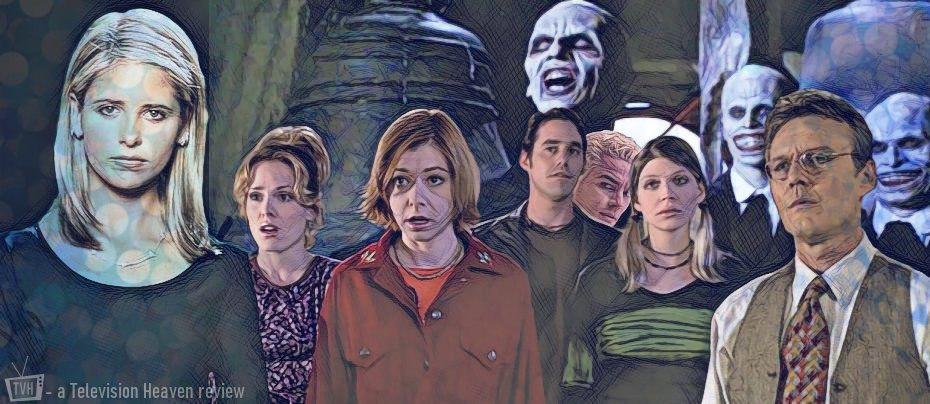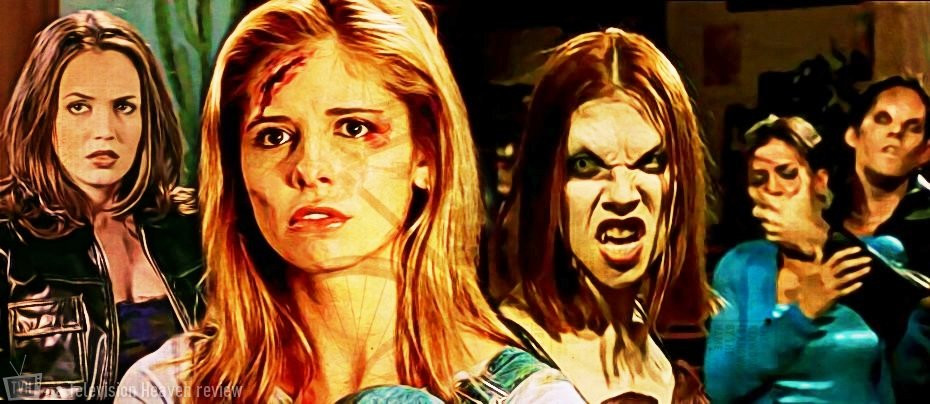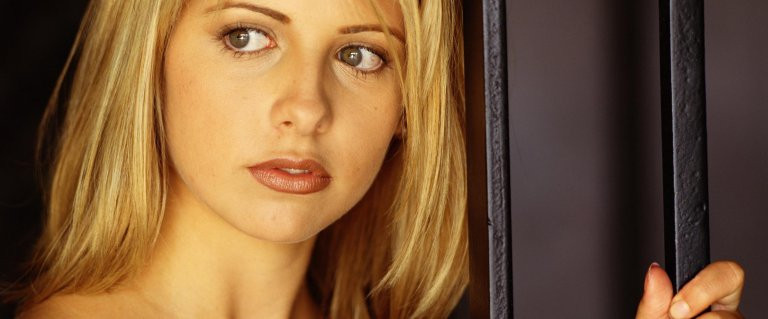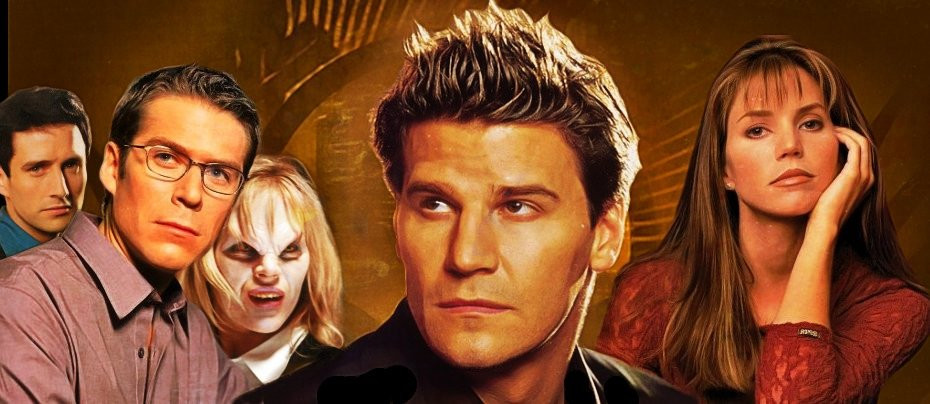
Angel - Season 1
Angel – season one (1999-2000)
Angel really works in this series. Boreanaz is allowed to show that he's actually a pretty decent actor, particularly when given comedic material
Review by Daniel Tessier
After three seasons with achieving critical and ratings success, Buffy the Vampire Slayer needed one more thing to show it had truly arrived: a spin-off.
In a way, Angel, created and produced by Joss Whedon and David Greenwalt, reversed the decisions that made Buffy so unique. Instead of focusing on a young woman who parodied the trope of the helpless blonde girl who's picked off in the horror movie by inverting it and making her the hero, Angel revolved around a big, burly bloke. Instead of using horror for a metaphor for adolescent anxieties to create a unique teen drama, Angel was a show designed for proper grown-ups, honest. Instead of small-town America, Angel was consciously urban and very (sometimes almost self-paradoxically) dark.
Both did one thing exactly the same, though: they took a character who didn't quite work and remade them into someone who could hold a series. Just as Sarah Michelle Gellar's Buffy was the definitive improvement on Kristy Swanson's movie version, David Boreanaz was able to make a walking plot point into an actual character.
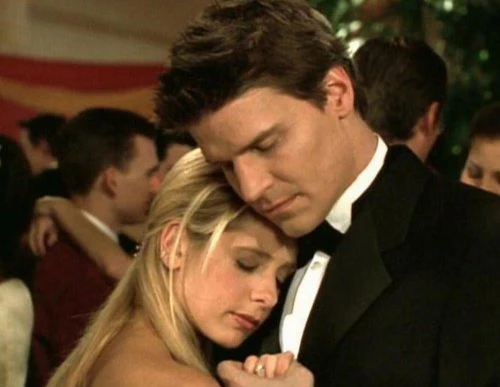
Now, this isn't to attack Angel as he was on Buffy. He did his job there: providing the heroine with a love story and all the associated angst. In many ways, this was a clever inversion itself of the usual action fare, in which the leading lady is merely there as someone for the hero to fight for, either winning her as a reward or losing her to provide more drama. Angel didn't need to have much personality to work as a character under these circumstances, and his evil alter ego, Angelus, is noticeably more interesting and entertaining, with both the writers and Boreanaz clearly having more fun with the happy-go-lucky murderer than the brooding romantic.
Which might make the idea of an Angel series something of a losing bet. Yet, Angel works. In fact, it works brilliantly, and at its best I'd say it even surpasses Buffy (don't stake me yet). A neo-noir para procedural set in L.A revolving around a vampire with a soul sounds like it should be the most painfully corny show imaginable, yet the writers and performers pull it off. Crucially, they allow the characters self-awareness: Angel isn't quite as tongue-in-cheek as Buffy, but the scripts are happy to revel in how silly the overall concept is, which only makes the descents into darkness more powerful.
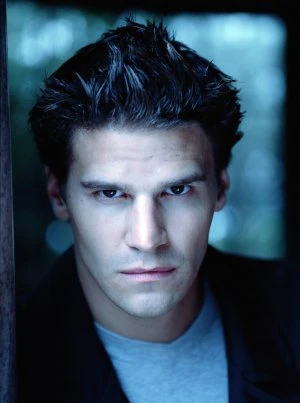
And yes, Angel really works in this series. Boreanaz is allowed to show that he's actually a pretty decent actor, particularly when given comedic material. It's not that Angel stops being a broody creature of the night, but that this is merely one part of his character. Angel, in his own series, gets his own sardonic humour, miles from Angelus's over-the-top style. He even gets to don the odd disguise and false persona during his investigations. He gets to have human moods beyond “hopelessly in love,” “weighed down by guilt” and “fighting the good fight.” Perhaps the best part is that the writers chose to embrace Angel's extreme age, not only allowing them to explore a long and complex backstory (that they could happily make up as they went along), but to give him odd little interests and skills. Frankly, Angel is a bit of an old duffer, never quite up-to-speed with technology and out of the loop on culture. No wonder we didn't get that Giles spin-off: Angel was already doing the “sexy older man who can't keep up with the kids” schtick.
Of course, none of this would work if Angel was constrained by his purpose on Buffy. He had to have a story and a goal beyond being with the Slayer, and so the writers carved out a new destiny for him, one that would run through the series, taking some very unexpected twists and turns on the way. To begin with, though, Angel was formulated as a detective show, with the vampire trying to atone for his centuries of misdeeds by “helping the helpless.” At least early on, there was an attempt to keep ordinary, mundane crimes as part of his remit, with episodes beginning with his helping someone get away from a violent ex, or giving them the courage to give evidence in court. It wasn't long, though, before the supernatural and fantastic became the entire focus of the show.
After initially running a brief pilot episode for The WB, Whedon and Fury were commissioned to produce a full series. (The pilot has never been released but a handful of shots made their way into the mournful opening titles.) The first episode, “City of...” introduces the new set-up and makes it apparent why L.A. was the perfect choice for setting. A huge city, known for its sun as much as its bustling night, where the super-rich and tragically poor live almost side-by-side. A place that's supposedly the embodiment of the American dream, where a nobody from “some town you've probably never heard of” can become a star, but where far more people fall and are swept away. An aggressively modern city built on ancient indigenous peoples' lands. Plus, there's the angel in the name.
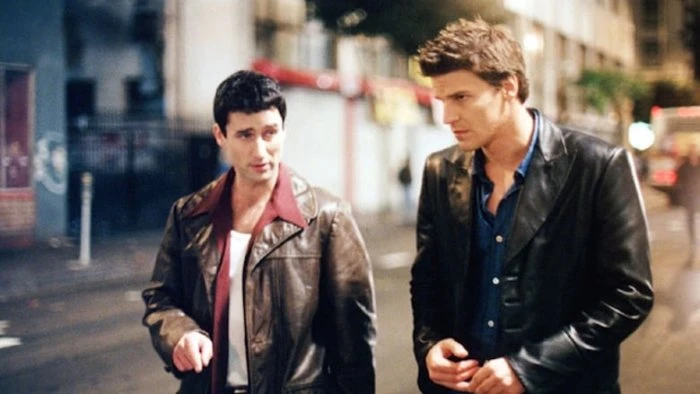
“City of...” sees Angel, having left Buffy and Sunnydale behind, as lost as he was before he got there. He fights off vampires and the like as they harass and attack young women, fighting with his own bloodlust at the same time. He has no direction, just a vague sense of trying to atone. Into his life steps Doyle, with an odd proposition. Originally, Whedon had intended for Max Perlich to return as the noble demon Whistler (from the second season Buffy storyline “Becoming”) but instead opted to create a new character for the regular role. Played by Glenn Quinn (Roseanne, Shout), who was able to use his native Dublin accent for the first time in his acting career, Doyle is a down-on-his-luck, heavy drinking but likeable rogue, who happens to be half-demon on his father's side. He generally tries to keep this hidden, although when he needs to become stronger for a fight (or accidentally when he sneezes), he shifts into his demonic form: blue-green and covered in thorns.
Doyle has also been cursed with painful and incapacitating visions, sent by the ever-mysterious force of good in the Buffyverse referred to only as “the Powers That Be.” His visions have led him to Angel, and he is able to, with some difficulty, convince the vampire that working alone is going to end up with him succumbing to his darker nature before too long. Doyle has had a vision of a young woman named Tina (Tracy Middendorf – Boardwalk Empire, The X-Files) who has fallen in with a rich and powerful magnate, Russell Winters (Vyto Ruginis – CSI, House, NCIS: Los Angeles) who is now harassing her. He tells Angel where to meet her and, his being tall and handsome and all, they quickly hit it off.
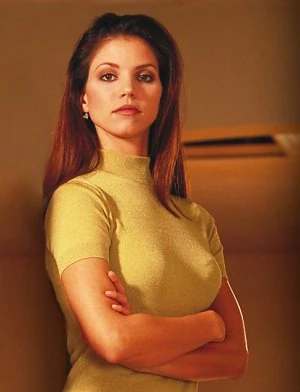
During his time spent with Tina, Angel bumps into Cordelia Chase (Charisma Carpenter) at a party, trying hard to meet someone with influence and kick start her acting career. Cordelia is, at first, the same self-absorbed character we knew from Buffy, except she no longer has money and is fully versed in the horrors of the night. Still, there's a lot of development in store for the character as the series goes on. Tina discovers that Angel was sent to find her, understandably thinks this is dodgy as hell and runs away, back into the arms of Winters... who reveals that he is actually a vampire. Quite an ancient one from his gruesome appearance, he quickly kills and feeds from Tina now that she's become a nuisance. Instead, he sets his sights on someone fresher... and sets up a meeting with Cordelia when he sees her on footage from the party.
It's a straightforward but bold episode that sets up Angel's first case as a complete failure. It sets the tone of the series: there isn't always going to be a happy ending. Of course, Angel saves Cordelia from Winters, before confronting the seemingly untouchable vampire lord at his solicitors' office, dispatching him in a brilliantly abrupt way. With little fanfare, the ultimate villain of Angel is established: Wolfram and Hart, the law firm that literally makes deals with the devil. Unlike Buffy, which would have a different Big Bad each season, Angel, while bringing in short and mid-term villains, had a unified force of evil to fight throughout the series. Wolfram and Hart – in ancient history the Wolf, Ram and Hart – provide both a mythic force for Angel to battle, as they strive to engineer their preferred conditions for the apocalypse, and a mundane, depressingly human antagonist. For all the vampires and demons that they both employ and represent, Wolfram and Hart are largely human. It's a perfect villain for a contemporary American series: people who will knowingly defend the guilty in return for money and influence, protected by the veneer of law. That they represent literal monsters as well seems almost irrelevant.
Wolfram and Hart could easily be a faceless corporation, but several of the nefarious lawyers become major recurring characters. Most notable is Lindsay MacDonald, played actor and singer Christian Kane (Leverage, Into the West, The Librarians), who appears right from Angel's first encounter with Wolfram and Hart at the end of the first episode. Kane originally auditioned for the part of Riley on Buffy, but it's hard to see him working in that role: he's about a foot too short for the huge strapping farm boy, and there's just something too untrustworthy in his eyes. He's perfect for Lindsay though. He's something of the golden boy of the up-and-coming lawyers at the firm, but he's plagued by an unfortunate amount of conscience, leading him to stand up to the firm when they cross a line (as in episode 1.21, “Blind Date,” where he reaches out to Angel for help when Wolfram and Hart hire an assassin to kill some sacred children). He also becomes far too personally involved in the ongoing dispute with Angel, with the two of them becoming vicious rivals.
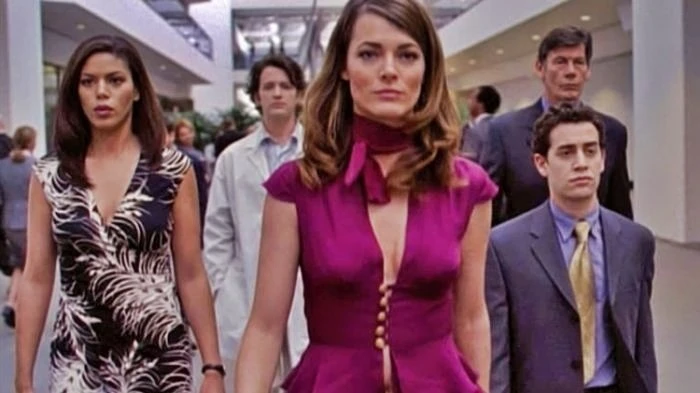
While Lindsay is Angel's primary rival, two other lawyers are assigned to deal with Angel. Lee Mercer (Thomas Burr) is so aggravating that even the other members of the firm hate him. More interesting is Lilah Morgan, played by actor and model Stephanie Romanov (Homicide: Life on the Street, Menno's Mind). Lilah is incredibly competitive and ambitious, providing Lindsay with a direct rival at the firm. She's a bit of a stereotypical ice queen, but Romanov gives her enough charisma to make her work, and she becomes one of the mainstay characters of the series. The three of them answer to Holland Manners (Sam Anderson – Perfect Strangers, Lost), Head of Special Projects – Wolfram and Hart's euphemistic term for assassinations and diabolical schemes. Manners, although he has no direct interaction with Angel for some time, is a great villain, with Anderson making him sinister and unnerving by how reasonable he acts.
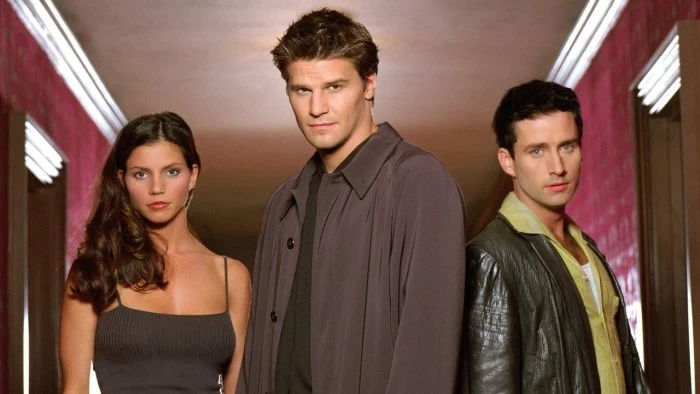
“City of...” ends with Cordelia essentially foisting herself on Angel and Doyle, and deciding that they should set themselves up a detective agency – Angel Investigations. In theory, people come to them when in need, which supposedly pays the bills, but the majority of their cases come from Doyle's visions. Episode 1.2, “Lonely Hearts,” sees Angel forced to do the thing he feels most uncomfortable with – try to make small talk in public – when a rash of murders linked to a bar demand investigation. It turns out to be the work of a burrower demon, leaping viscerally from body to body in the hopes of finding a suitable host, in a twisted reflection of hook-up culture. More importantly, it introduces another recurring character: Detective Kate Lockley, played by Elizabeth Rohm (Law & Order, Eureka Street, Bull).
Kate, investigating the same murders, becomes an uncomfortable ally for Angel, helping him on certain cases in a not-strictly-legal fashion as his police liaison. She's also set up as a potential romantic interest for him, and to begin with, there's some strong chemistry between them. There are some good episodes focusing on them, especially 1.6, “Sense & Sensitivity,” a comical look at touchy-feely sensitivity training that sees Kate and her entire department under the spell of a magical talking stick (not a stick that talks, the other kind), and she's frequently at the edge of cases which have a supernatural cause. It isn't until 1.11, “Somnambulist,” that she discovers Angel is a vampire. “Somnambulist” is something of a standout episode. Angel becomes worried that he is going on midnight murder sprees when he starts dreaming of his past exploits, and worryingly familiar killings occur. They're eventually revealed to be the work of Penn, one of Angel's many vampire proteges from history, played by none other than Jeremy Renner, years before he hit the big time with The Hurt Locker, The Bourne Legacy, The Avengers and Hawkeye.
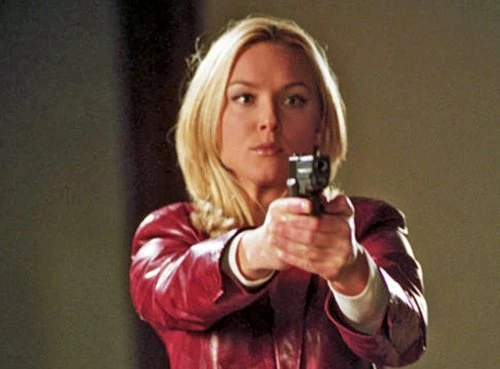
Kate becomes obsessed with the supernatural and antagonistic towards Angel, especially after he discovers her inattentive, old-school cop father (John Mahon – The X-Files, Armageddon) is bent and acting as a mule for demonic drug-runners. Kate blames Angel for her father's inevitable death when he outlives his usefulness, becoming a thorn in Angel's side from then on. It's good that the “will they, won't they” doesn't run on too long, and Kate's struggle to accept a world full of vampires and demons is well played. At the end of the day, though, there's the sense that Kate never quite works, in spite of a strong performance by Rohm. Perhaps this is because Kate's original character was darker and more complex than what we got. The original second episode, “Corrupt,” introduced Kate as an undercover vice officer posing as a sex worker, who had become addicted to crack and the lifestyle. Only days before shooting was set to begin, “Corrupt” was scrapped and replaced with “Lonely Heart.”
The first part of the season is marked by Angel, Cordelia and Doyle's developing relationship. Angel, never the most easy-going person, gradually opens up and allows them both to become genuine friends. He is, naturally, reassured by Cordelia's promise that, should he ever become Angelus again, she'll “kill (him) dead.” Doyle falls for Cordy immediately, and she slowly comes to develop feelings for him too, in spite of her initial reluctance to be involved with someone like him. Doyle undergoes the most development in a short time. Although he seems pretty self-serving, he repeatedly comes through for both Angel and Cordelia, and we learn more about his past when we meet his estranged wife Harry (Kristin Dattilo – Southland, Dexter) in the comedic episode 1.7, “The Bachelor Party.” It turns out his life was pretty good and he was an all-round decent sort of guy, before his demon half erupted and turned everything upside-down. “The Bachelor Party” is a fun, throwaway episode, guest-starring Carlos Jacott (Ken in Buffy 3.1, “Anne”) as Harry's new demon fiancé, but more important as a step in Doyle's development, as he begins to let go of his past baggage.
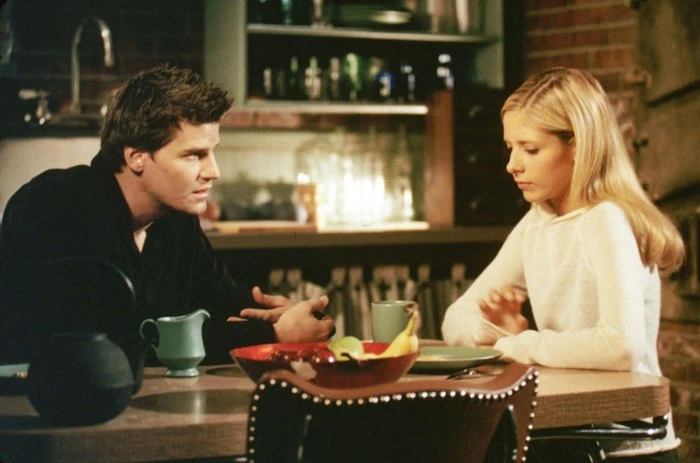
1.8, “I Will Remember You,” is a turning point episode for the series, and the first direct crossover with Buffy. Following Angel's surreptitious helping of Buffy in Sunnydale in Buffy 4.8, “Pangs,” Buffy heads to LA to confront Angel. They are both attacked by a powerful warrior demon, sent to stop Angel from taking his place in battle for the last days. They defeat the creature, but its regenerative blood infects Angel, causing him to return to life as a human being. After some initial uncertainty, the two heroes fall back into each others arms, finally able to enjoy a somewhat normal relationship now that Angel is no longer a vampire and, therefore, no longer cursed. The demon has itself regenerated, though, and Angel's bull-headed attempt to defeat it almost gets him killed.
Angel makes his way to the Oracles (Carey Cannon and Randall Slavin), celestial beings who exist beneath the city, and comes to understand that he no longer has a part to play in the protection of humanity. He implores them to turn back time twenty-four hours, so he can destroy the demon once-and-for-all before he is made human. Only Angel and the Oracles remember any of what happens. It's a beautifully played episode, with a stunning performance from Gellar in particular, and underlines how Angel is committed to truly helping others, but also to his self-punishment. He has to earn redemption, not simply accept a lucky break. His role as champion in the last days is now assured.
He does, however, tell Doyle and Cordelia about the events, which has a profound affect on Doyle in particular. Angel's heroism has rubbed off on Doyle already, but this last act makes him rethink himself completely. In the following episode “Hero,” Angel Investigations take on the task of helping a group of Lister demons – green-skinned, half-human refugees – escape from a vicious demonic purity regime named the Scourge. These demons, who are both especially hideous and also blatant Nazi pastiches, are pure-blood obsessives, committing genocide against any demon tribes who have “tainted” themselves with human blood. (The irony being that, as humanoid creatures themselves, they cannot be pure demons at all and must have their own human blood in their ancestry, just as many Nazis secretly had mixed ancestry.)
The episode gives Cordelia pause for thought, as she is forced to accept that not all demons are evil monsters (part of a general shift in Angel that makes it clear that the nature of good and evil is far less binary than originally presented). She finally finds out that Doyle is half-demon and tells him to ask her out at last, sharing a kiss before he realises that he must sacrifice himself to stop the Scourge from wiping out the Listers.
It's a gorgeous, heartbreaking episode, all the better for how understated Quinn's performance is in those last moments. Watching it back now is especially moving, as Quinn sadly died only three years later from an accidental drugs overdose. Whedon had originally planned to write Doyle out even earlier, but had kept him on as he was so impressed with Quinn's performance, and promised him a suitably epic send-off. Still, it's quite likely that Quinn's substance abuse issues, which had started many years before, made a longer-term role problematic. Quinn had a few roles after Angel, including an occasional recurring part in Fair City and a lead role in the film At Any Cost, before he died aged only thirty-two.
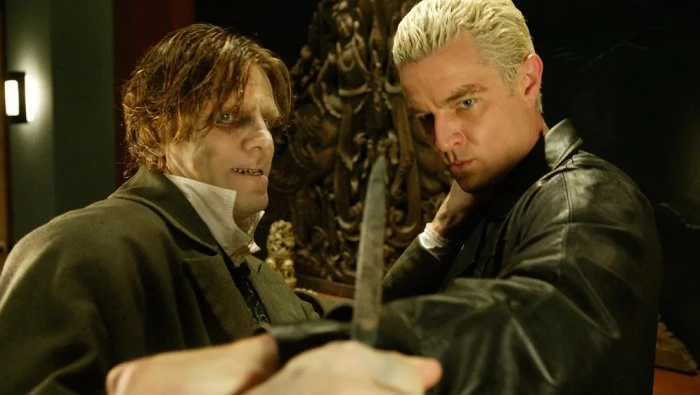
Angel had already influenced Doyle with his selfless (although arguably short-sighted) actions in 1.3, “In the Dark,” a fun bit of melodrama and action which sees both Oz (Seth Green) and Spike (James Marsters) stop off in L.A. to catch up with Angel. Following from Buffy 4.3, “The Harsh Light of Day”, Oz gives Angel the magical Gem of Amarra, which makes any vampire invulnerable and able to walk around in sunlight. Spike comes after it, quite stupidly employing another vampire to help him take Angel down. Marcus, a softly-spoken maniac, tortures Angel for hours while Spike searches for the gem, but inevitably takes it for himself. Angel defeats him and takes the gem back for himself, but destroys it, a prefiguring of his decision not to remain human five episodes later. It's hard not to agree with Doyle though when he asks, “What about all the daytime people you can help now?”
Spike, Oz and Buffy were far from the last familiar faces to appear on Angel. Following Doyle's death, the series immediately brought in his replacement in episode 1.10, “Parting Gifts.” Alexis Denisof returned as Wesley Wyndham-Pryce, now a disgraced ex-Watcher due to his loss of two Slayers from the Council's oversight, who has reinvented himself as a “rogue demon hunter.” (Cordelia immediately asks the obvious question: “What's a rogue demon?”) In spite of his best efforts, Wesley is just as clumsy and mild-mannered as he ever was. He does, however, bring with him an enormous occult knowledge that makes him a valued member of the team. To begin with, Angel mainly allows Wesley to stay on out of pity, but he becomes a more and more vital team member and undergoes some of the most remarkable development of all the regular characters.
However, while Wesley takes Doyle's place in Angel Investigations, he doesn't take on his role. That goes to Cordelia, who rapidly discovers that Doyle passed on his curse to her when he kissed her, landing her with the agonising visions. At least this means she's secure in her job – you can't fire “Vision Girl” - and while Cordelia initially tries to get rid of the visions, she gradually comes to embrace her new purpose.
Following her revival in the two-part Buffy story “This Year's Girl”/“Who Are You,” Faith arrives in L.A, on the run from the Council's gang of hit men and at war with the entire world. Episode 1.18, “Five by Five,” sees her fight and steal her way through the underbelly of the city, before she's recruited by Lindsay, Lilah and Lee to assassinate Angel. “No problem,” she says, doing her best to take him down during the day before abducting Wesley so that Angel will come to her.
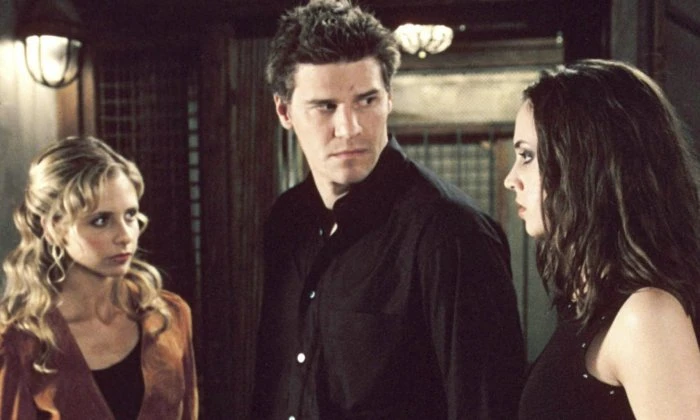
It's here that Angel finally reaches its potential as a darker, more adult alternative to Buffy. This is the harsh, brutal world that the abandoned “Corrupt” could have shown us, embodied by Faith and her violent struggle. Faith viciously tortures Wesley as revenge for his own betrayal of her, and while it's still constrained by the limits of what can be shown on prime time television, what we do see is harrowing enough. Angel eventually finds them and confronts Faith in a brutal fight that, finally, ends with Faith in tears, collapsing into his arms, begging him to kill her. “I'm bad, I'm evil!” she sobs as she finally stops running and fighting and confronts the self-hatred that has pushed her forward all this time. While Denisof deserves praise for his performance as the brutalised Wesley, Eliza Dushku proves that she is perhaps the strongest actor in the series in an astonishingly powerful and moving final scene as the broken Faith. A truly exceptional episode, “Five by Five” is never really topped in the series.
The second part, “Sanctuary,” is a quieter but still powerful episode, as Faith begins the long, difficult process of accepting her responsibility for her actions. Angel, of course, understands what it's like to be weighed down by the guilt of terrible deeds, and forms a strong bond with Faith as he defends her against Wolfram and Hart, the Watcher's Council and Buffy, who arrives from Sunnydale seeking her fellow Slayer. Buffy storms into the fray and frankly comes off very poorly, jeopardising Faith's redemption. Her anger is understandable, as is Wesley's of course, and yet he too helps protect Faith when she is in danger. Kate is steered by Lindsay into arresting Angel for harbouring a fugitive, planning to leave him in a windowed cell waiting for the morning light, only to find that Faith has handed herself in, finally able to take responsibility. The episode ends with Faith in prison, starting to find some peace, while Angel heads to Sunnydale to try to salvage what remains of his friendship with Buffy (picked up in Buffy 4.20, “The Yoko Factor”).
While “Five by Five” and “Sanctuary” show just how good this series can be, there are plenty of episodes in the first season that prove it's still a show finding its feet. 1.4, “I Fall to Pieces” and 1.5, “Rm w/a Vu” are competent telly-level horror but nothing special, although the latter at least introduces Dennis, Cordelia's new phantom housemate – everyone's favourite character we never see. Both 1.12, “Expecting,” and 1.13, “She,” are fairly dreadful, creating a two-episode run of episodes that feel like they're trying hard to be feminist but end up coming across misogynistic. “Expecting” sees Cordelia impregnated by a one-night stand as a vessel for demon spawn, and while it trades on the old trope of pregnancy-related horror (see Rosemary's Baby, et al) it ends up as a polemic against the evils of sex. “She” almost hits the mark, featuring the remarkable Bai Ling (Entourage, Lost, Anna and the King) as Jhiera, a refugee from an extradimensional realm called Oden Tal. The women of her race have an organ in their spine that burns when they are sexually aroused, and this is surgically removed by the dominant men of their race, keeping them docile and servile. On paper, it doubtless worked as an allegory for the worldwide abuse of women and the practice of FGM, but as realised, it's a lot of Angel battling with his hormones around an irresistibly sexy alien. It's almost worth it for the glimpse at Angel's dance moves, but you'd be better off skipping it and reading Bai Ling's story, it's far more interesting and powerful.
1.14, “I've Got You Under My Skin,” stands out as a genuinely effective riff on The Excorcist, as a young boy possessed by a demon terrorises his family. It's a clever episode that keeps you guessing as to the exact nature of the threat, with some strong scenes of the exorcism. For the first time, the script highlights Wesley's past and his poor relationship with his father, something Angel shares and a real slow-burning storyline in the overall series. 1.16, “The Ring,” is throwaway monster fighting stuff, and the aforementioned “Blind Date” - basically evil Daredevil – is interesting only for Lindsay's flirtations with the side of good. 1.17, “Eternity,” runs an obvious story that has an actress passing her prime (Tamara Gorski – Hercules: The Legendary Journeys) attempt to convince Angel to turn her into a vampire so that she'll be young forever. To this end, she drugs him, causing a blissful high that reverts him, temporarily, to his evil Angelus alter ego. Absurdly suggesting that Angel's curse can be briefly hoodwinked by chemicals, the episode is mostly memorable for Cordelia's painful next steps in her acting career.
1.20, “War Zone,” is a strong episode that delves further into the contradictions of L.A. While Cordelia schmoozes a rich new client David Nabbit (occasional recurring actor David Hermann – Bob's Burgers, Office Space) who's been playing with demon girls, there's a war being fought on the streets. A gang of youngsters, predominantly people of colour, struggle to survive against a vampire gang that preys on them. It's an obvious but effective allegory to the two worlds present in any big city; while the wealthy Nabbit is in awe of the hidden world of demons existing alongside his own, he remains completely oblivious to the very real world of the poor and disenfranchised, existing just streets away from his office and home.
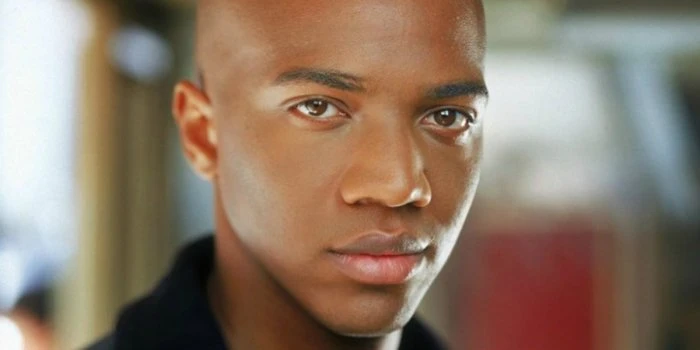
The episode introduces the excellent J. August Richards (Marvel's Agents of SHIELD, The Hypnotist) in his breakout role as Charles Gunn, the leader of the L.A. vampire-hunting gang. Richards gives a natural and nuanced performance as Gunn, whose fight for survival has already become a way of life and who is in danger of giving into the same bloodlust that drives the vampires. Thanks also to some decent writing (which only occasionally drops into cringeworthy attempts of street dialogue), Gunn builds to become a vital and beloved character, returning in the following “Blind Date” and the series finale. Before then, he has to overcome his automatic mistrust and hatred of Angel, who's a lot more white, middle-class and dead than he is. It's a pretty powerful episode that shows a different side of the series' L.A. setting and finally mixes up the demographics of the main characters.

Alongside the contemporary main stories, we're given glimpses of a second narrative that explores Angel's early life, including his transformation into a vampire. Julie Benz returns as Darla, the beautiful vampiress who sired Angel and gave him his eternal thing for small blondes. The flashbacks occur in various episodes, although the most significant is 1.15, “The Prodigal,” which contrasts Kate's difficult relationship with her father with Angel's hatred of his own. Angel (or rather Liam, his amusingly prosaic birth name) is a drunk and a down-and-out, forever unable to win his father's approval when Darla spots him and decides to turn him into one of her kind. These flashbacks run through the entire series, exploring both the bloody reign of Angelus and his subsequent cursing with a soul.
The season comes to a climactic end with “To Shanshu in L.A.” The Shanshu in the title refers to a mysterious prophecy, written on an ancient scroll until recently in the possession of Wolfram and Hart. Now that Angel has stolen it, and discovered that it pertains to the actions in the apocalypse by “the vampire with a soul,” the law firm decides that Angel Investigations have become a liability. They have big plans for Angel, and set about raising... something... to take him on. While they're working on the rituals, Lindsay, Lilah and Holland invoke a demonic sorcerer (Todd Stashwick – 12 Monkeys) to keep Angel busy and sever his connections to the Powers that Be.
The sorcerer, Vocah, takes a refreshingly broad view of his job, doing a straightforward job of Angel Investigations' office by simply blowing it up, with Wesley inside. Cordelia is dealt with in a more mystical manner, when he removes any filter she has on her visions, leaving her screaming and incapacitated by the constant, agonising barrage of images. He even murders the Oracles. Fortunately, Wolfram and Hart don't know much about Gunn, so he is free to keep an eye on Cordy and Wes in the hospital while Angel takes on Vocah himself, before fighting Lindsay in a vicious fight that serves to give the firm time to raise their prize.
With Vocah defeated, Angel and a recovering Wesley are able to free Cordelia from the endless visions, but she is a changed woman. The experience is the last major step in her development from self-centred antagonist to compassionate hero, and now, having seen just how many people are out there in need of help, she vows to become a better person and live to help others. Not that it immediately comes naturally though, and she's still the painfully blunt person she always was.
Angel, for his part, learns the final part of the Shanshu prophecy: that after the final battle, he shall gain his reward and become human. What he doesn't know is what Wolfram and Hart raised in their ritual. The final shot of the season reveals it: shivering and scared inside the cage, is Darla.

It's a fascinating cliffhanger to leave the season on, and with Angel's mission statement reinforced by his prophesised role as champion, the series is set to become more mythic. After an uneven first season, jumping between the mediocre, the serviceable and the absolutely brilliant, Angel was ready to build into something really special in its second year.
Published on June 9th, 2022. Written by Daniel Tessier for Television Heaven.


